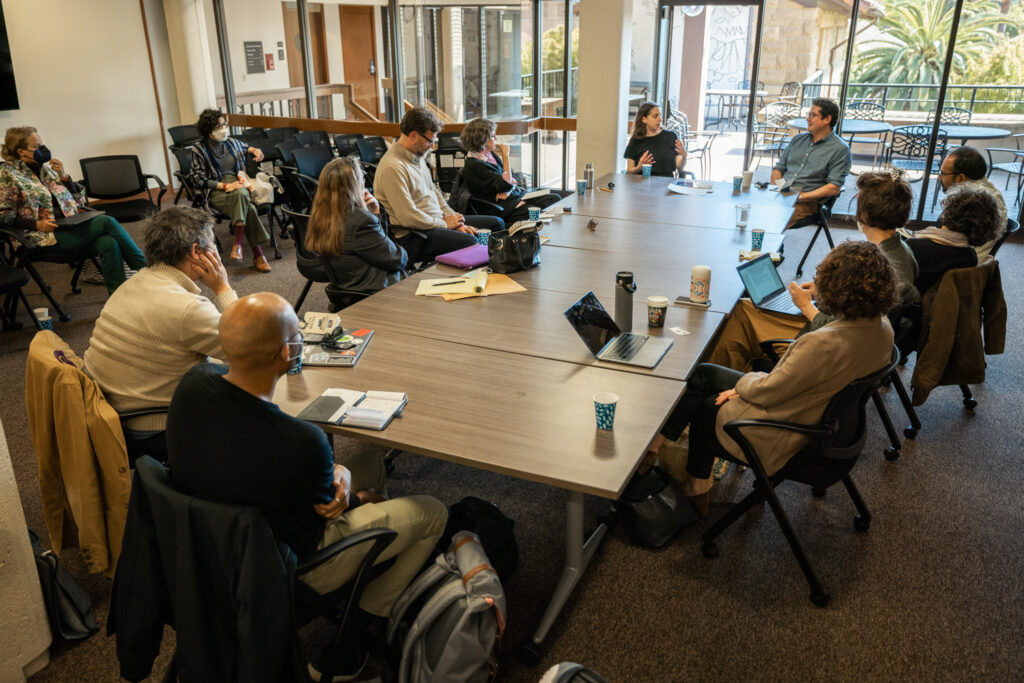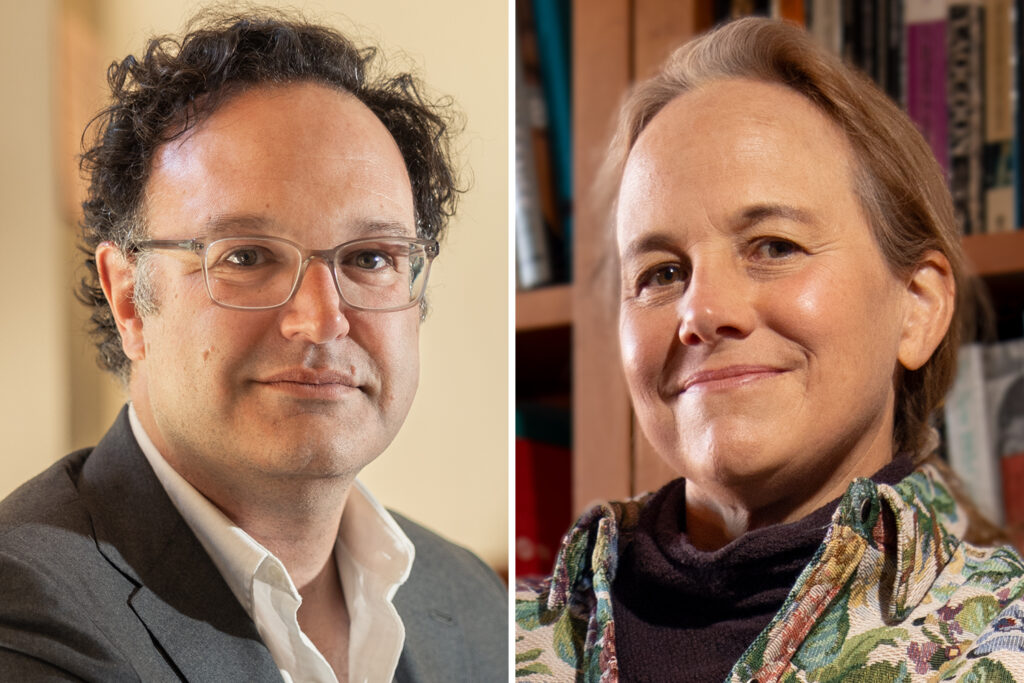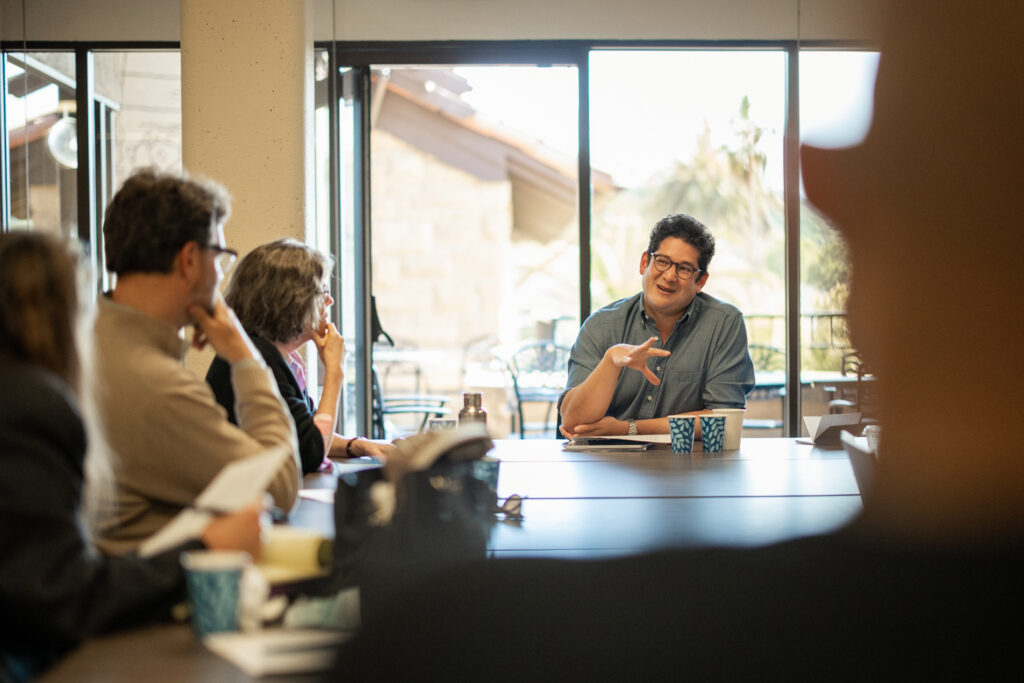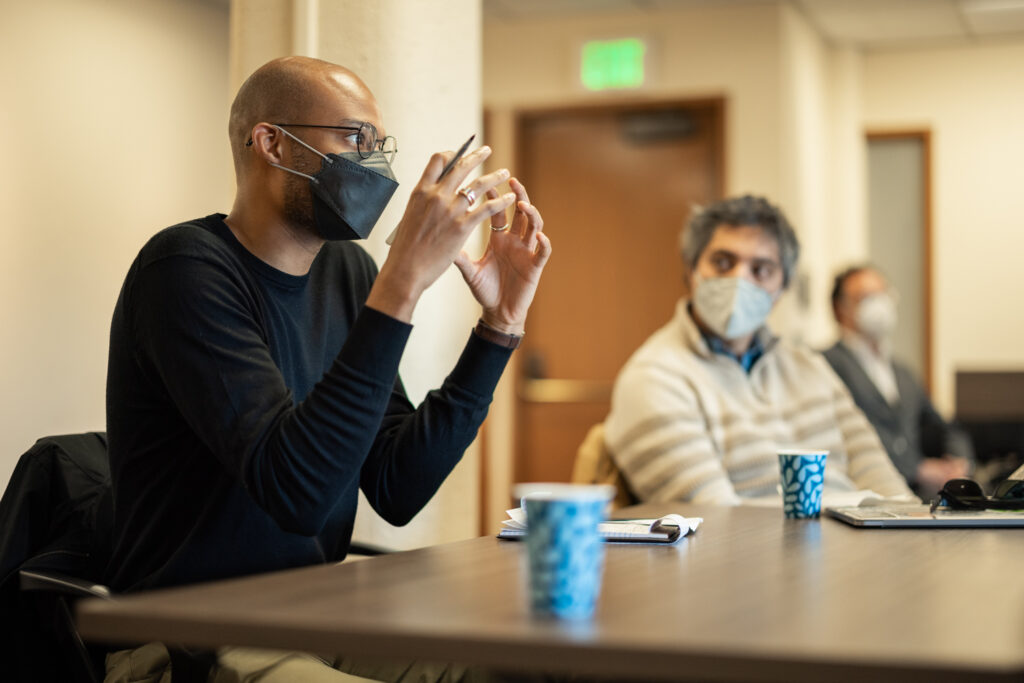Stanford Public Humanities helps faculty engage with a diverse audience beyond academia
The program aims to equip faculty and students with the skills to engage in public discourse and communicate their ideas outside the halls of academia.
The faculty members hailed from a variety of disciplines but gathered with a common purpose: to learn how to pitch and craft magazine stories.

A recent workshop hosted by the Public Humanities program aimed to provide faculty members with skills for writing articles and books for a general readership. (Image credit: Andrew Brodhead)
“Maybe you could just tell me who you are, what you study, and what brought you here,” said Joshua Rothman, an editor at The New Yorker, after they had settled into their seats in the Terrace Room of Margaret Jacks Hall. All expressed a desire to write for an audience beyond their academic peers, enthusiasm about popular writing, or both.
It was the first meeting of an April 14-16 workshop led by Rothman and organized by Stanford Public Humanities. Based in Stanford’s School of Humanities and Sciences, the Public Humanities aims to provide faculty members and students with skills for writing articles and books for a general readership.

Blakey Vermeule, right, and Mark Greif co-direct the Public Humanities, which aims to provide faculty members and students with skills for writing articles and books for a general readership. (Image credit: Andrew Brodhead)
Mark Greif, associate professor of English, and Blakey Vermeule, the Albert Guérard Professor in Literature and professor of English, co-direct the program. “I joined the Public Humanities because I believe that great scholarship deserves a large audience,” Vermeule said. “Also, I love learning new skills, and I believe everyone can benefit from a little guidance in shaping their ideas so that their research comes to life for diverse readers.”
Greif said the Public Humanities helps satisfy a growing hunger among Stanford faculty members – and not just humanities scholars – to engage in public discourse.
“There’s always been a subset of people in the academy who have thought that writing for a general audience is something they’d undertake only after attaining some scholarly mountaintop,” Greif said. “One thing I think that’s changed is that it’s become much more acceptable for scholars to write for general audiences early in their careers.”
Learning new skills
The Public Humanities was conceived in 2019 as part of the Long-Range Vision’s Changing Human Experience initiative and launched in the spring of 2020, a few months into the pandemic.
Since then, more than 50 faculty members across four Stanford schools have participated in workshops organized by the program. The workshop on magazine writing was the most recent and the first to be held in person. Editors and agents at leading publishers, including Random House and Farrar, Straus, and Giroux, have run three workshops on writing trade books. Lois Kazakoff, the former deputy editorial page editor of the San Francisco Chronicle, and Natalie Jabbar, associate director of the Public Humanities, have led two on writing op-eds. The program provides a number of other resources for faculty members, such as one-on-one help with pitching an article or book idea or connecting with an editor.
The workshops have paid off for many faculty. Antero Garcia, an associate professor of education, credits his participation in a trade-book workshop for helping him and his co-author, Alix Dick, a Los Angeles-based writer and filmmaker, secure a literary agent as well as a publishing contract for a forthcoming book, The Cost of Convenience: Accounting for Undocumented American Life. Garcia also said he drew on what he had learned in an op-ed workshop to co-author an opinion piece that was published in EdSource in 2020.
More than 180 students have enrolled in Pitching and Publishing in Popular Media, a one-unit course taught by Laura Goode, the associate director for student programs in the Public Humanities. Although the course began for graduate students, Goode has also started teaching a version for undergraduates due to popular demand. During the summer, graduate students can also take Advanced Pitching and Publishing to work with her on a specific media project, such as an essay or a book proposal.
Beyond scholarly expertise
At the recent workshop, Rothman explained that book reviews, think pieces, and cultural criticism get relatively little ink in most publications. So, he encouraged his workshop participants to consider reporting on experiences and events outside their areas of scholarly expertise.

Joshua Rothman, an editor at The New Yorker, leads the Public Humanities’ magazine-writing workshop on April 14. (Image credit: Andrew Brodhead)
“Deep knowledge and expertise obviously can be a ticket, but they can also be a little bit of a cage because they can prevent you from writing about things that you’re actually very, very well suited to write and that your expertise would enrich in ways that are unique,” Rothman said. “If you saw your professional identity as a sort of sweetener for simply a good idea for a piece, then your total range of possible pitches would grow, and the likelihood that you’d land a piece would expand.”
This advice resonated with Matthew Clair, an assistant professor of sociology and an expert on the criminal justice system. “It got me thinking about how magazine writing could afford me the chance to explore topics a bit outside my wheelhouse,” Clair said.
He became increasingly interested in writing for a general audience after establishing the Court Listening Project, an archive and research study that documents the experiences of people processed in courts in the Bay Area.
“One of my motivations as a scholar is to influence the way people think about policies and practices with respect to the criminal legal system,” he said. “So, I really hope my ideas and work are read by policymakers and everyday people, not just sociologists.”

Sociologist Matthew Clair, an expert on the criminal-legal system, attends a magazine-writing workshop held by Stanford Public Humanities on campus April 14-16. (Image credit: Andrew Brodhead)
In the past few years, Clair has published several articles in The Nation and the Boston Review. He said he valued the guidance and encouragement he received from Greif and Jabbar just before publishing his most recent article in The Nation.
Tanya Marie Luhrmann, the Albert Ray Lang Professor and professor of anthropology, was also inspired by Rothman’s advice. Although Luhrmann is an experienced author of trade books and general-interest articles – she has written pieces for Harper’s Magazine and Raritan and more than 30 op-eds for The New York Times – she said she learned a lot in the magazine-writing workshop.
“It’s just so helpful to have the building blocks of magazine writing laid out,” she said. “I can see them now in a way I couldn’t see them before.”
Future directions
The program is continuing to expand its offerings for faculty and students. Last fall, the Public Humanities launched the series “In Their Own Words,” in which faculty members write essays on a topic they’ve grappled with throughout their academic careers and then are recorded reading them. On May 24, the series will debut on KQED Public Radio as a pilot program and include short interviews featuring the first three faculty authors from the series: Vermeule, Garcia, and Emanuele Lugli, assistant professor of art and art history.
The Public Humanities also plans to continue its popular speaker series, “What Is a Public Intellectual Today?”, which has featured writers such as Jia Tolentino, Jill Lepore, and Wesley Morris. This year, the Public Humanities also partnered with the McCoy Family Center for Ethics and Society to bring two prominent authors to campus – Elif Batuman, who received her doctorate in comparative literature from Stanford in 2007, and Sheila Heti – for readings, conversations, and lunches with students.
“Since the initiative started, we’ve been thrilled to see how much interest there is in communicating our research to the public sphere,” Vermeule said. “We hope to help build a lively community of students and faculty who are excited about approaching their scholarship in new ways.”
Matthew Clair is an assistant professor, by courtesy, in the Stanford Law School.
Antero Garcia is an associate professor of education in the Graduate School of Education.
Mark Greif is an associate professor, by courtesy, in the Department of Comparative Literature in the Stanford School of Humanities and Sciences.
In Their Own Words is a collaboration between the Stanford Public Humanities Initiative and Stanford University Communications.
If you’re a Stanford faculty member (in any discipline or school) who is interested in writing an essay for this series, please reach out to Natalie Jabbar at njabbar@stanford.edu.